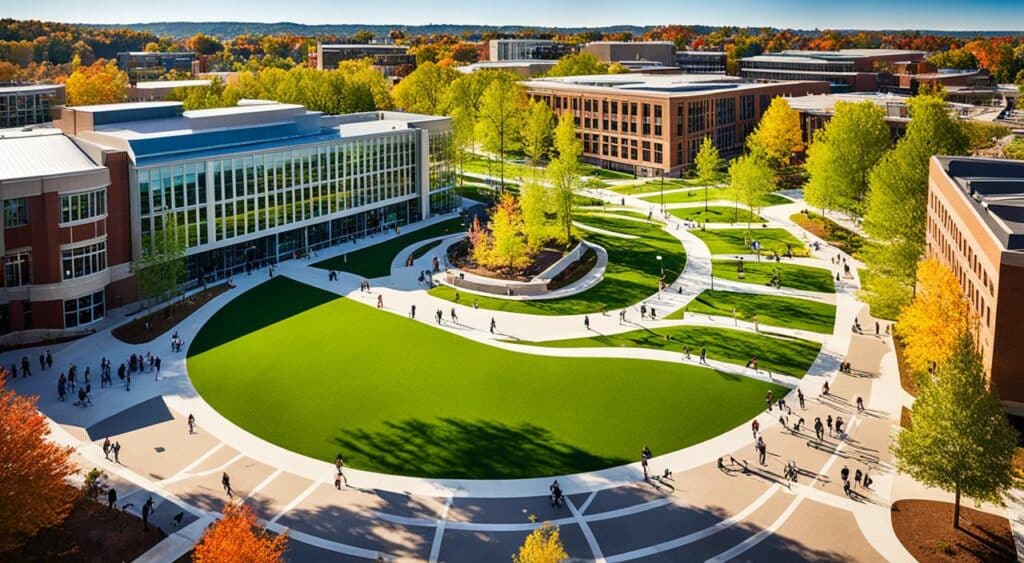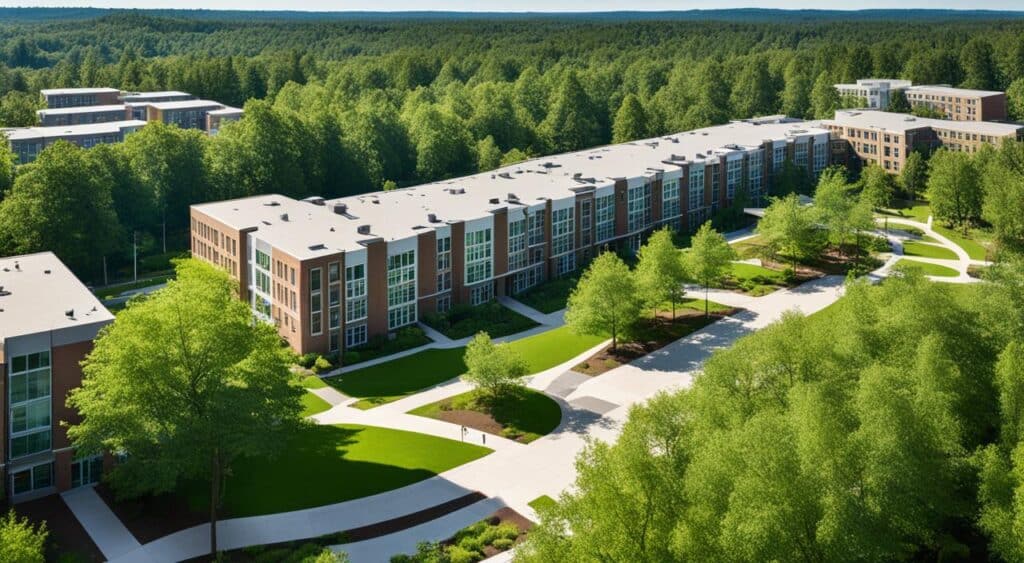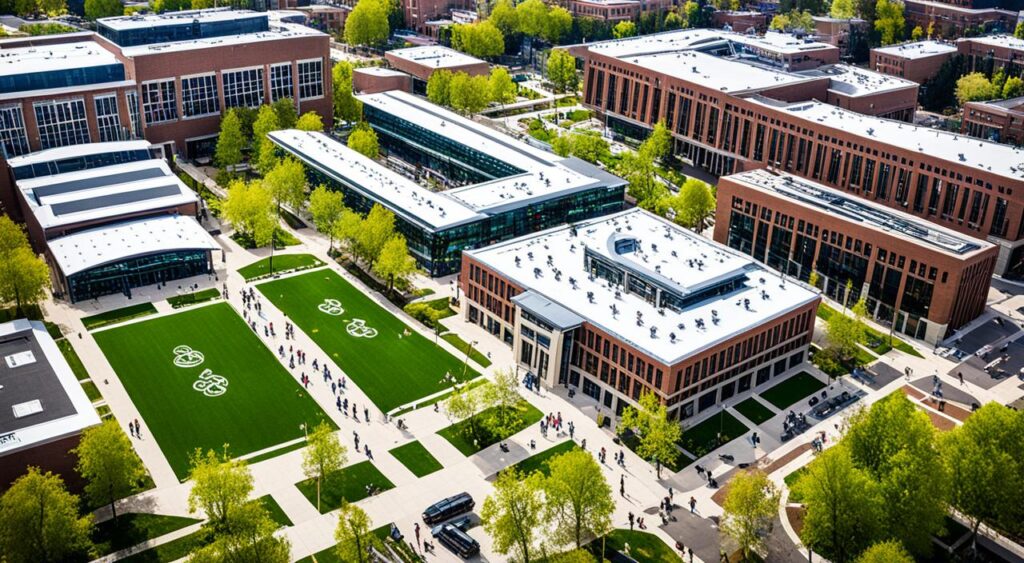Choosing a university campus is key to a student’s growth. It offers top-notch education and a supportive community. The campus’s reputation, programs, and environment are vital for a great college experience.
Students should look at these factors to match their goals and values. Making the right choice can lead to new chances and experiences. These can shape their future in big ways.
Key Takeaways
- The campus environment, reputation, and resources can greatly impact a student’s academic and personal success.
- Carefully evaluating factors like academic quality, campus culture, and affordability can help students find the right university fit.
- A well-chosen campus can provide access to world-class facilities, diverse opportunities, and a supportive community.
- The campus location, transportation options, and accessibility are crucial considerations for a seamless college experience.
- Researching a university’s extracurricular activities, career resources, and diversity initiatives can help students find the right fit.
University Campus’ Reputation and Branding
Choosing a university can greatly affect a student’s future in academics and their career. A university’s good name and high rankings can lead to better internships, jobs, and graduate programs. Also, the academic quality and faculty at a university can make a big difference in a student’s education.
Name Recognition and Rankings
Students should look into a university’s rankings, accreditations, and strong academic areas. This helps them pick a campus that offers a world-class education and the tools to reach their goals. A university’s good name and high rankings show its dedication to excellence and giving students a top-notch educational experience.
Academic Quality and Programs
Looking at a university’s academic quality, students should check the range of programs available, the faculty‘s skills, and the research and innovation resources. A university’s focus on academic excellence and its ability to offer a comprehensive, innovative, and challenging course can boost a student’s success in their field.
“The reputation of a university is not just about its name recognition, but also the quality of its academic programs and the opportunities it offers its students to grow and thrive.”
Location and Campus Setting
The location and campus setting of a university greatly affect a student’s experience. Whether the campus is in an urban, suburban, or rural area matters. It affects the resources and activities available, the cost of living, and transportation needs.
Urban, Suburban or Rural Environment
Urban campuses offer diverse cultural experiences and internships and job opportunities. Suburban or rural campuses provide a calm setting for study. Students wanting to explore a vibrant city or have easy access to amenities might choose an urban campus, like the University of Arizona in Tucson. Those seeking peace might like suburban or rural settings at Ohio State University or Arizona State University.
Distance from Home
The distance from home affects a student’s decision. It impacts their ability to visit family, manage finances, and maintain a support system. Prospective students from the U.S. or Washington state might want a university campus close to home. This lets them stay connected with their local community and support network. Others might choose colleges far away, like the University of Arizona or Arizona State University, to explore new environments and gain independence.
Prospective students should weigh the pros and cons of each campus setting. This helps them find the best fit for their personal preferences and academic goals.
Campus Culture and Atmosphere

Choosing a university means looking at its culture and atmosphere. These elements shape a student’s experience. They create a place that feels like home and boosts school spirit.
Campus Architecture and Design
The look and feel of a campus affect how students see their world. Beautiful buildings and green spaces make a campus inviting. They encourage students to explore and feel connected.
The design shows what the university values and its history. It tells students about the school’s spirit and goals.
Student Life and School Spirit
- Vibrant student organizations and clubs for many interests, from studies to fun activities.
- Exciting events and traditions that unite everyone, like sports games, concerts, and festivals.
- A deep sense of school pride and unity, built through campus events and shared values.
A welcoming campus culture supports students in their studies and personal growth. It helps them do well in school and after graduation.
“The vibrancy of a university’s campus culture can be the difference between a fulfilling college experience and one that leaves students feeling disconnected and unsatisfied.”
Housing and Residential Life

Choosing a university or college means looking at the housing and life on campus. Students should think about living on or off campus. They should also look at what the residence halls offer.
On-Campus or Off-Campus Living
Living on-campus makes the college experience more immersive. It gives students easy access to campus resources and a social network. Off-campus living offers more independence but comes with challenges like finding transportation.
Residence Hall Amenities and Services
- Laundry facilities
- High-speed internet connectivity
- Dining options and meal plans
- Recreational spaces and common areas
- Dedicated staff and programming for residential life
These amenities and services make living on campus better. They help students feel comfortable and fit in with the campus community. By looking at these options, students can pick a university that suits them well.
“The residence hall experience can be a game-changer for students, fostering a sense of belonging and providing the support they need to succeed academically and socially.”
| On-Campus Housing | Off-Campus Housing |
|---|---|
| Closer proximity to campus resources | More independence and flexibility |
| Built-in social network | Potentially lower costs |
| Dedicated staff and programming | Increased responsibility for transportation and logistics |
Dining Options and Meal Plans
When university and college life calls, the campus dining scene is key for students. It’s vital to fuel up for those long academic days. Luckily, many colleges offer a variety of dining options to help students stay healthy and happy.
Students can choose from full meal plans or pick what they like at different dining spots. Whether you want healthy food, cultural dishes, or quick bites, there’s something for everyone. The campus dining scene mirrors the student body’s diversity and energy.
The dining experience is more than just eating. It’s a place where students can meet new people and feel part of a community. Universities design their dining spots to build connections and friendships over meals.
The dining options and meal plans at a university greatly affect a student’s life and learning. By looking into the dining services offered, prospective students can make sure they get the food and convenience they need to do well in college.
Affordability and Financial Aid
Choosing a university means looking at costs and financial aid. It’s important to know the total cost, including tuition, fees, and living expenses. Also, check out scholarships and grants to lessen the cost.
Tuition and Fees
Tuition and fees are big parts of university costs. Students should look at tuition rates, fees, and extra costs like lab fees. This helps them balance their budget with their goals.
Scholarships and Grants
Universities offer many scholarships and grants to help students. These can be based on merit, need, or special interests. Applying for these can make college more affordable.
| University | Tuition and Fees | Scholarships and Grants |
|---|---|---|
| University of Arizona | $12,467 (in-state), $37,467 (out-of-state) | Over $400 million in scholarships and grants awarded annually |
| Arizona State University | $11,572 (in-state), $29,428 (out-of-state) | Over $200 million in scholarships and grants awarded annually |
| Ohio State University | $11,936 (in-state), $34,068 (out-of-state) | Over $150 million in scholarships and grants awarded annually |
“The availability of financial aid can make the difference between a student being able to attend their dream university or not. Exploring all options is crucial for ensuring an accessible and affordable higher education experience.”
University Campus Extracurricular Activities
University life is full of extracurricular activities that let students try new things, learn new skills, and feel part of a community. There are many clubs, sports, and recreation options. These activities make the university experience better.
Student Clubs and Organizations
Students should look into the many clubs and organizations on campus. These groups cover many interests, like academics, creativity, culture, and helping others. Being part of a club lets students find new hobbies, learn to lead, and meet people who share their interests.
Sports and Recreation Facilities
A good university also has great sports and recreation spots for students’ health and fun. You can find modern gyms, pools, sports leagues, and top-notch places for varsity sports. These activities help students balance their life and feel proud of their school.
Getting involved in campus life makes students grow personally, learn new skills, and make memories that last. It’s a big part of their university time.
“Joining student organizations has been one of the most rewarding aspects of my university experience. It has allowed me to explore my passions, develop leadership skills, and forge lifelong friendships.”
– Jane Doe, Senior at the University of Arizona
Transportation and Accessibility

How easy it is to get around a university campus can really change a student’s life. They should look into the campus’s transport options like shuttles and buses. Also, being close to places like shops, restaurants, and entertainment spots matters a lot.
Campus Transit System
Many universities have good transport systems for students. These include shuttle buses, bike-sharing, and rideshare services. It’s important for students to check how often and where these services go. This helps them get to classes, activities, and campus resources easily.
Proximity to Local Amenities
Where a university is located is key for students. Being close to shops, restaurants, and entertainment means students can save time and enjoy the local community. This is great for students living off-campus or needing to go out often.
Looking into a university’s transport and access can help students move around easily. This makes their academic and student life better.
Career Preparation and Resources

Choosing the right university can greatly affect a student’s career path. The University of Arizona, a top research university in Tucson, Arizona, excels in career preparation. It offers many resources and chances to help students get ready for their careers.
Career Services and Internships
The University of Arizona’s Career Center has many services to help students with their careers. It offers workshops on resumes and cover letters, mock interviews, and career fairs. These services help students improve their professional skills and find great internships.
Internships let students use what they’ve learned, make industry contacts, and stand out in the job market.
Graduate and Professional Programs
For students wanting more education, the University of Arizona has many graduate and professional programs. Students can aim for a master’s degree, a doctoral program, or a special certification. The university has top faculty and modern facilities to help students reach their goals.
By choosing the University of Arizona, students get the support they need for a successful career. This helps them grow and move forward in their fields.
Choosing a university like the University of Arizona means getting ready for a great career. It offers strong support services to help students succeed in their careers.
“The University of Arizona’s commitment to career preparation has been instrumental in shaping my professional journey. The resources and opportunities available have truly set me up for success.”
– Jane Doe,University of ArizonaGraduate
Also Read : The Secret Advantages Of University Scholarships
University Campus Diversity and Inclusion

Choosing a university means looking at how diverse and inclusive it is. This affects a student’s growth, learning, and views on the world. It’s important to see how diverse the students, teachers, and staff are.
Student Body Diversity
A welcoming campus lets students meet people from different backgrounds and cultures. This helps them get ready for a world that’s more connected. Looking at the student population’s diversity helps students know what they’ll experience.
Faculty and Staff Diversity
The diversity of teachers and staff also shapes a campus. A diverse faculty brings many views to class. A diverse staff makes sure all students feel supported. Checking how a university values diversity shows its commitment to a caring community.
“A diverse and inclusive campus environment not only enriches the academic experience, but also prepares students to navigate and thrive in an increasingly globalized world.”
Conclusion
Choosing the right university campus is key to a student’s future. It affects their studies, personal life, and career. Look at the campus reputation, location, and atmosphere. Also, consider affordability, housing, transportation, and diversity.
Research and think about what you need and want. This way, you can find a university that fits you. You might look at the University of Arizona in Tucson, ASU in Ohio, or Washington universities. Each place offers something special in higher education.
Make a smart choice that matches your goals. This way, you set yourself up for a bright future. You’ll find discovery, leadership, and chances to succeed in your field. With the right campus and resources, you can explore and aim high. You’ll get the best learning experiences and commitment to excellence to reach your goals.
FAQs
Q: Why should I explore university campus options when choosing a college?
A: Choosing a good university campus is important as it provides a conducive environment for learning and personal growth. By exploring different campus options, you can find a community that aligns with your interests and values.
Q: How can I schedule a campus tour to research potential universities?
A: Many universities offer campus tours that can be scheduled through their websites. These tours are a great way to explore the facilities, academic buildings, and student life firsthand.
Q: What benefits come with attending a world-class research university?
A: Attending a world-class research university offers access to cutting-edge research, top faculty members, and opportunities for academic excellence. It can also provide a network of industry connections and a prestigious education.
Q: What is the significance of choosing a state university for undergraduate studies?
A: State universities often offer a more affordable education compared to private institutions. Choosing a state university can provide access to quality education, diverse majors, and state-of-the-art facilities.
Q: How can I virtually tour a college campus if I am unable to visit in person?
A: Many universities offer virtual tours on their websites, allowing prospective students to explore the campus remotely. These tours provide a detailed look at the campus, facilities, and student life.
Q: What type of research opportunities can I expect at a top research university?
A: Top research universities offer a wide range of research opportunities in various fields such as science, technology, engineering, and math (STEM). Students can participate in hands-on experiments, work with renowned scholars, and contribute to groundbreaking discoveries.
Q: How can I discover the best major for my academic interests at a university?
A: Universities offer a diverse range of majors to explore and choose from. Students can attend info sessions, speak with academic advisors, and participate in introductory courses to find the major that aligns with their passions and career goals.
Source Links
- https://uwaterloo.ca/future-students/missing-manual/applying/nine-factors-consider-when-choosing-university
- https://www.collegematchpoint.com/college-matchpoint-blog/2018/4/making-the-right-choice-how-students-decide-which-college-to-attend
- https://www.snhu.edu/about-us/newsroom/education/why-is-college-important




